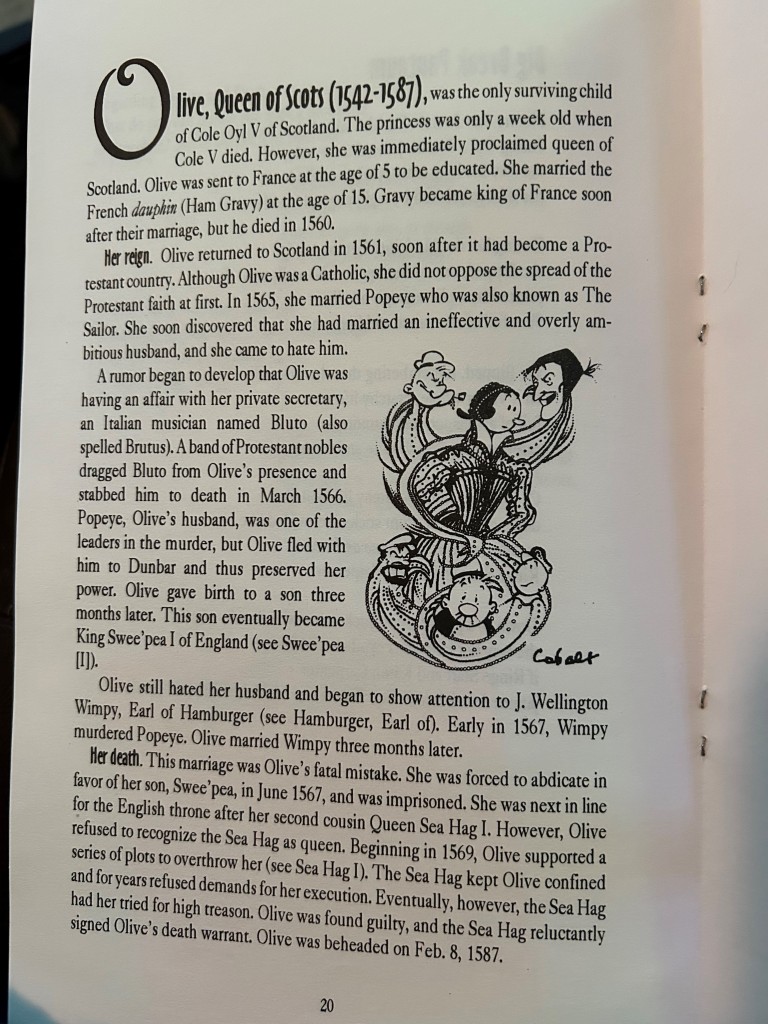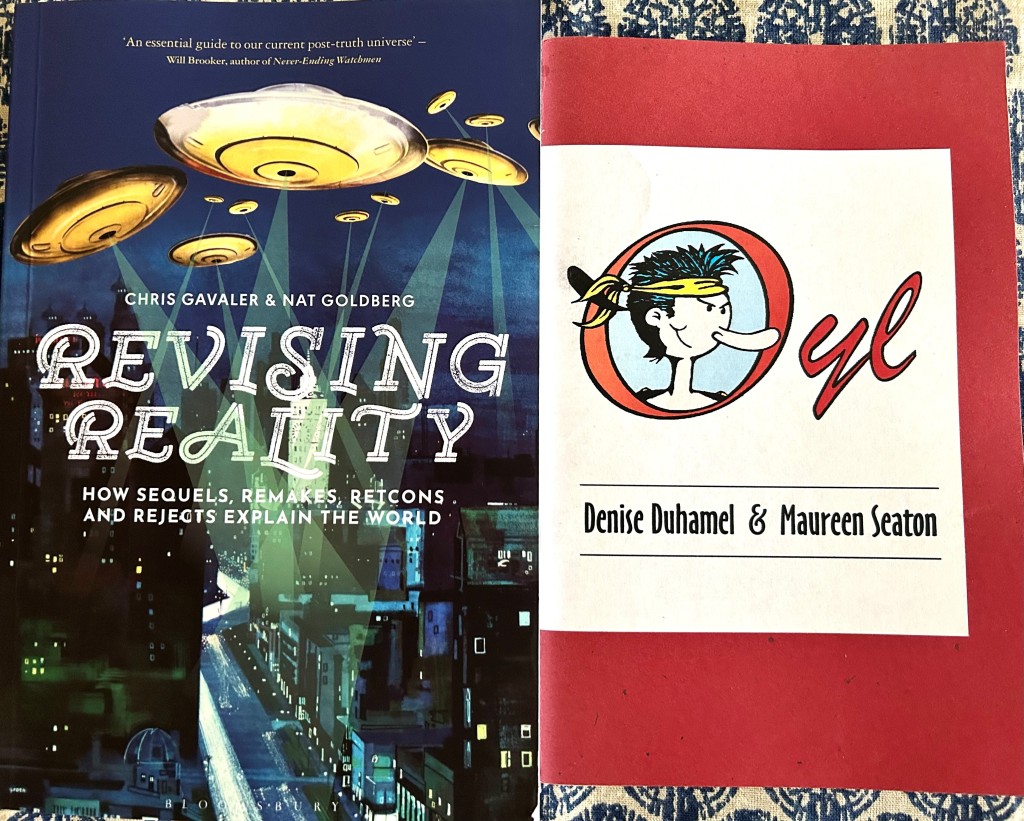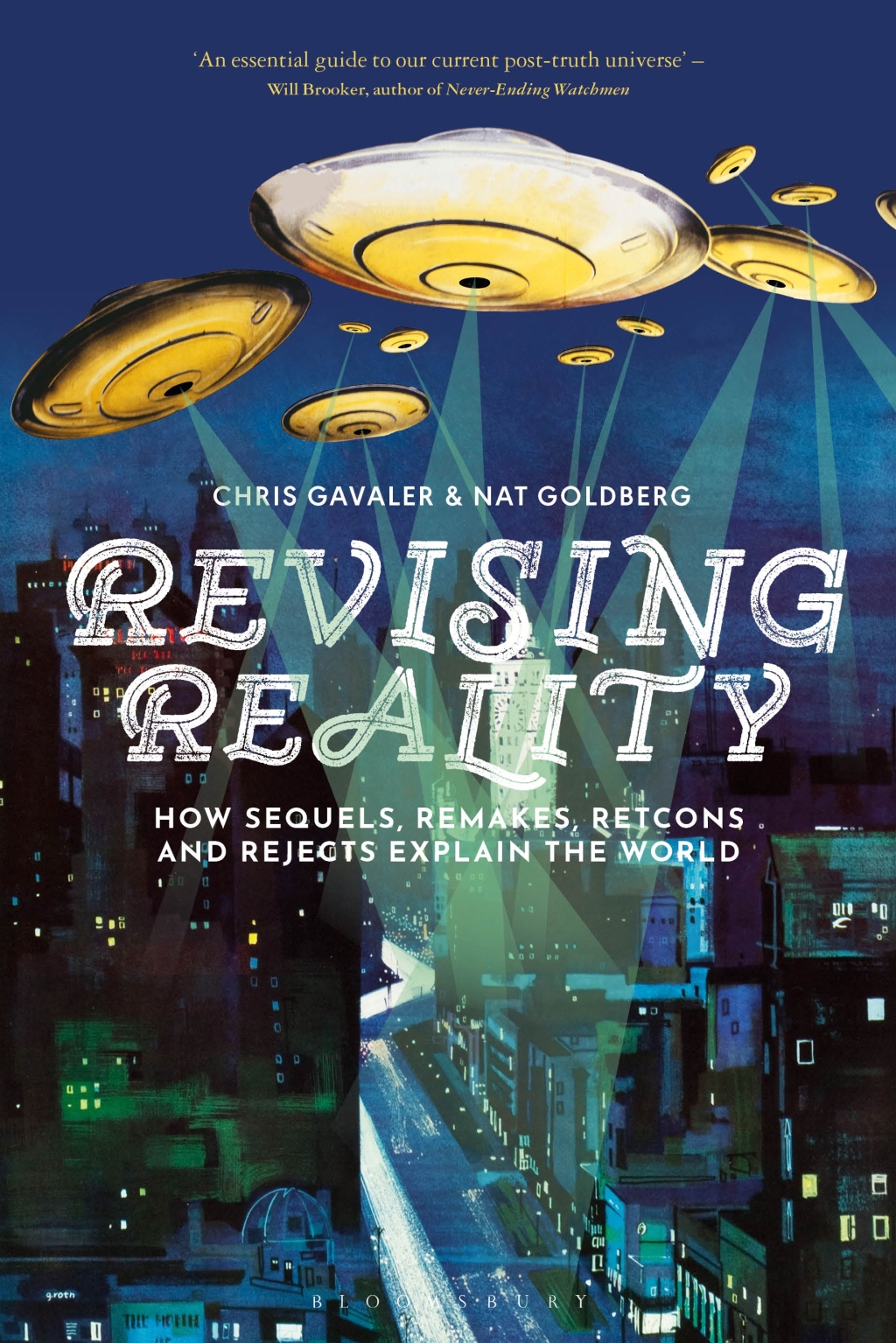Mini-interview below with Nat Goldberg and Chris Gavaler on the occasion of their latest publication. Topics range from Star Trek to hybrid poems to literary collaboration to the Church of America. Enjoy!
LW: Congratulations on the debut of your great new book Revising Reality: How Sequels, Remakes, Retcons, and Rejects Explain the World. A question that always interests me: what’s your deep reason for writing it? I read it as philosophy for laypeople, taking on examples of wide interest from history, law, science, and more, a lot of them saturated with culture wars controversy. You write that “we can best understand reality through the lens of sequels, remakes, retcons,1 and rejects” (13). Are you hoping to nudge some Americans to get real about our scary political scene?
NG: Thanks, Lesley! I can’t speak for Chris, but my motivation was only to show that these ideas from pop culture—sequels, retcons, remakes, and rejects—are more important and useful than people realize. As you say, they can be applied to history, law, science, and more. If applying those ideas to current politics manages to nudge people to get real about that, then that’s icing on the cake.
CG: And it turns out we whipped up a lot of icing. After writing Revising Fiction, Fact, and Faith: A Philosophical Account (Routledge 2021) for a highly academic audience, we wanted to apply the same concepts to a broader range of topics and in a style that’s friendly to more readers. That broader range sent us in all kinds of political directions, including Ronald Reagan remakes, Church of America retcons, and Trump’s indeterminate Golden Age history.
LW: I enjoyed all the references to Star Trek, Tolkien, and other works of science fiction and fantasy. Does speculative fiction have a special role in helping people understand reality’s nature and boundaries? Or is it just a motherlode for examples because you’re both fans (reader, I’m married to Chris)?
NG: Speculative fiction does have that role. I’m a philosopher by training and teach a special-topics course called “Science Fiction and Philosophy.” Students read Ted Chang, N.K. Jemisin, and other speculative-fiction authors as philosophers: authors making (implicit) logically deductive arguments in support of philosophical views. That was in the background when I wrote my portions of Revising Reality.
CG: Although I’m the comics guy of this dynamic duo, Nat is the Tolkien and Star Wars expert. Tolkien established all of our ur-examples in the previous book, so I do think speculative fiction series are more prone to reveal the full range of revisions. What’s surprising is how nonfiction follows the same patterns.
LW: I have to test a poem or two on you, although perhaps it’s better to call them hybrid-genre writing, mimicking interviews and encyclopedia entries. I just reread a chapbook called Oyl by Denise Duhamel and Maureen Seaton (Pearl Editions, 2000). It’s a witty revisiting of the Popeye comics and cartoons, and it’s collaboratively written, like Revising Reality, so it seems apropos. Here are two examples from the collection: “Interview with a Comic Strip Diva” in Painted Bride Quarterly and the photo below of “Olive, Queen of Scots.” Either/both: sequels, remakes, retcons, or none of the above?

NG: I’m not dodging the question! Really! I just think that the passages are too short to know for sure. It’s possible that Popeye and gang go on to have later adventures that don’t contradict earlier ones, making one or both sequels. It’s possible that these later adventures reveal something new about earlier adventures (that I, as not much of a Popeye reader, am missing), making one or both retcons. If I had to pick one, though, they seem most likely both to be remakes: these are different versions of the characters, doing things that the better known versions from the comics and cartoons never did or would never do, without any revelation about earlier adventures. So, probably, remakes. Chris?
CG: Definitely remakes. Duhamel and Seaton’s history of Queen Olive does not (to the best of my knowledge) take place in our world, and it also doesn’t match the events of previous Popeye comics or animated cartoons or that improbable Robin Williams film from the 1980s (all of which do not take place in Europe during the 1500s). The interview is stranger though. For the two authors to sit and talk with Olive Oyl, the fictional character would have to exist in the actual world. Alternatively, fictional versions of the two authors exist in Olive Oyl’s world – which I think is distinct from any previous Olive Oyl’s world, and so another remake.
LW: Duhamel and Seaton wrote a lot of poems together; I’ve always been charmed by their “Ten Commandments for Collaboration” at the bottom of this short article. What are the pleasures and tensions involved in your own collaboration?
NG: Chris is my third collaborator, though with the previous two I wrote only one article each, while Chris and I have coauthored a dozen or so articles and three books. I can’t think of any significant tensions with Chris or my previous collaborators, because all had roughly the same work ethic and minimal ego. As for pleasures, work ethic stands out: I can spend a couple of hours writing, go off and take a walk, and when I come back—as if by magic—my mistakes have been fixed and a couple more pages have been added.
CG: My favorite Duhamel and Seaton commandment is definitely: “Thou shalt not be an egotistical asshole.” The words “trust” and “honor” come up multiple times too, directed both outwardly and inwardly, which is smart. The great thing about our collaboration is that Nat and I could probably have each written maybe 25% individually, so 50% in total, but it’s the other 50% that feels like magic. Where exactly did it come from?
LW: My favorite chapter is the one on memory: your funny disagreement about who had the insight about Christopher Lee’s roles2; that bananas Daily Show interviewee who remembered Obama being president during, and therefore partly responsible for, 9/11; and the insight that “we’re always revising ourselves (192). “Minds are…hyper-partisan about themselves”: I agree (181). Does this alarm or console you?
NG: Neither really. That’s just the way things are. What does alarm me is that most people don’t realize this. By the way, for the record, I’m right and Chris’s wrong on the Christopher Lee point.
CG: The fact that human memory is a complete shitshow is alarming. Knowing that fact I find oddly consoling. It reminds that the memory area of my brain is a hyper-partisan asshole hellbent on my self-promotion and that I should probably ignore it more often than not. Except regarding Christopher Lee and Nat.
*
1In case you don’t know the word “retcon”: a “retroactive continuity change”–a term from comics–refers to some new reveal that makes old understandings false, “causing an audience to reinterpret and discard some previous impression” (8). Nat and Chris give the example of Superman learning that a character called Ultra-Humanite had been masterminding other evildoers all along. Later in the book, they discuss judicial retconning of previous court decisions, including an 1803 retcon of the US Constitution granting the Supreme Court power to strike down laws. NOT in our original sacred document! Take that, originalists!
2 “Chris clearly remembers pointing out to Nat, who hadn’t realized this, that Christopher Lee played similar characters in two contemporaneous Hollywood blockbusters: Saruman, the number two bad guy in most of The Lord of the Rings trilogy, and Count Dooku, the number two bad guy in most of the Star Wars prequel trilogy… Nat, meanwhile, distinctly remembers pointing this same fact out to Chris, who hadn’t realized this” (170-171). I’ll add that since I saw these movies at Chris’ side during their debuts, I am quite possibly the first among us to have articulated this insight. Chris, after all, claims credit for my ideas constantly. Allegedly I’ve stolen his ideas, too, although my hyper-partisan brain vehemently denies it.


One response to “Revising reality in poetry, sf, & our partisan brains”
[…] Lesley Wheeler, Revising reality in poetry, sf, & our partisan brains […]
LikeLike